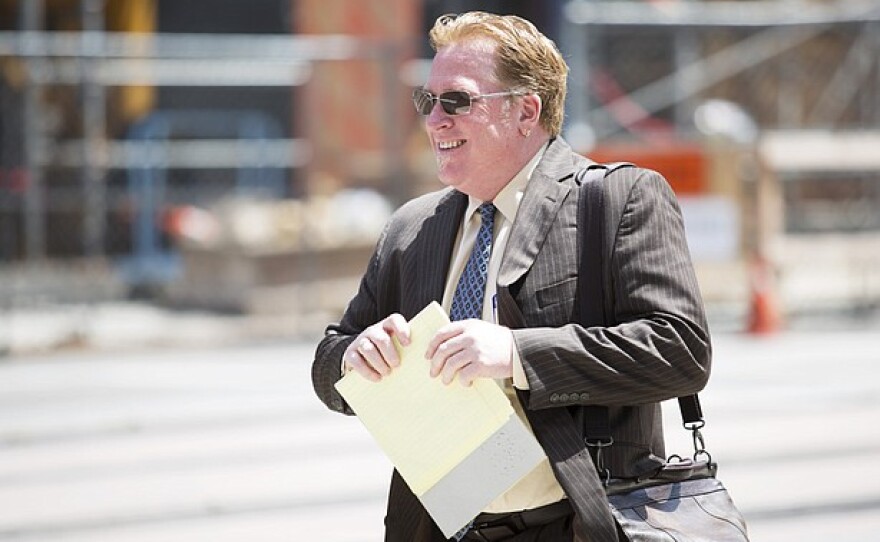Lawyer Cory Briggs announced his 2020 candidacy for San Diego City Attorney on Monday per a campaign website. Briggs is known for lawsuits against developers and government agencies and suing the city of San Diego. Briggs also announced back in January his plans to run for Mayor, but he dropped out of that race in May.
He sat down with KPBS Evening Edition anchor Ebone Monet to discuss his 2020 City Attorney campaign.
Q: Why do you want to be San Diego's next city attorney?
A: The City Attorney's office has been turned into a politics shop. We need to get it back to running as a straight up, objective law firm that provides a support role to the mayor and the city council. Right now, the City Attorney's office practices in politics disguised as lawyer-ing. That's not good for taxpayers. It's not good for voters. It's not good for accomplishing what the Mayor and the City Council set out to accomplish for the people who get them elected into office. I want to fix that. I want to take the office back to being just a straight up, regular law firm that gives the best possible advice to the Mayor and the City Council so that they can go out and do what they got elected to do.
Q: After being a frequent challenger of the city of San Diego, do you feel that you could offer politics-free advice?
A: Yeah. Look, the reason that my clients have hired me to sue the city on occasion, to sue other government agencies, is because politics is what's driving these decisions as opposed to being supported based on good legal advice. When you have the City Attorney influencing the decisions because he or she is politically motivated, the Mayor and the City Council end up making bad decisions because they're getting political advice from lawyers. What we need are the lawyers to be giving good legal advice so that the politicians are not getting the taxpayers in hot water in the first place. There's a right way and a wrong way to do things, and our current City Attorney frequently tells the City Council and the Mayor how to do it incorrectly, because it's politics driven. Once we get back to making decisions based on the law, just a straight-up reading, giving straight legal advice they can make the decisions.
Q: Do you think that that could possibly be a black eye during this campaign? How would you explain that to potential voters?
A: The proof is in the pudding. My clients sue. They win cases. The judges look at it. The judges conclude that they did the right thing, that they provided a public service and the judge approves the attorney's fees. That's all part of the way the system works. Think about it from the other side, when you have a politically-motivated City Attorney's office who sues the voters to block them from voting on something as important as the future of Mission Valley, to expand this very university by the way, when that happens and it costs the taxpayer $600,000 — who do they go to to get that money back? Nobody. The City Attorney's office gets to shrug its shoulders and say, "Too bad, so sad." That's unacceptable. I don't have that luxury in private practice, and I bring that ethic of putting the client first to the City Attorney's office.
Q: Can you tell us about San Diegans For Open Government and in your role with that organization?
A: Sure, I've been its attorney since the beginning. It has filed a lot of lawsuits against government agencies to make sure that the public gets all of the information to which it's entitled. Frequently, as I'm sure you know, the government stonewalls and doesn't like to turn over documents. So we've had to file a number of lawsuits to make sure that those documents were released.
Q: And we should disclose that your organization has filed a lawsuit against our media partner, inewsource, and KPBS via San Diego State University which holds our license. The lawsuit came after a series of investigative reports that outlined your ties to nonprofits. What would you say to critics who believe your intention is to benefit financially from these nonprofits by suing and then settling?
A: Well, so, two things: No. 1, you should make sure your audience also knows that I wasn't involved in that lawsuit. I have nothing to do with it. Not involved. That should be reported as well. So, I can't comment on it. Just not a participant in it. The question about whether I'd benefit from filing lawsuits — I'm a lawyer. I represent clients. I get paid for doing a good job for them. If I'm in the City Attorney's office I'm going to represent the city; acting through the Mayor and the City Council with the same vigor, with the same integrity, with the same experience and education that I bring to my private clients. Here's the difference between private and public lawyers: private lawyers always have to think about what happens if they screw up, because if they screw up two things could arise ... No. 1, the client could lose a lot of money, and No. 2, the lawyer could get sued for malpractice. Public attorneys don't take those things into account because public attorneys, like City Attorney Mara Elliott, when they screw up they just shrug their shoulders and say, “Well, the taxpayers will pick up the tab.” And they can't be sued for malpractice. So they have a very cavalier attitude toward protecting the public. I'm going to take my experience in private practice and bring it to the city where the taxpayers and the voters need to be put first to make sure that they're protected so that there's no politically motivated advice influencing what the Mayor and the City Council do.
KPBS reached out to City Attorney Mara Elliott's campaign for comment.
Mara Elliott’s campaign consultant, Dan Rottenstreich, responded saying, "City Attorney Mara Elliott is off and running for reelection with a stellar record of accomplishment protecting San Diego. We welcome any and all opponents to the race … He’s a millionaire shopping around for political office and he’s going to find out that winning the people’s trust is a lot more difficult than suing them.”







